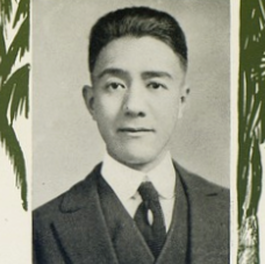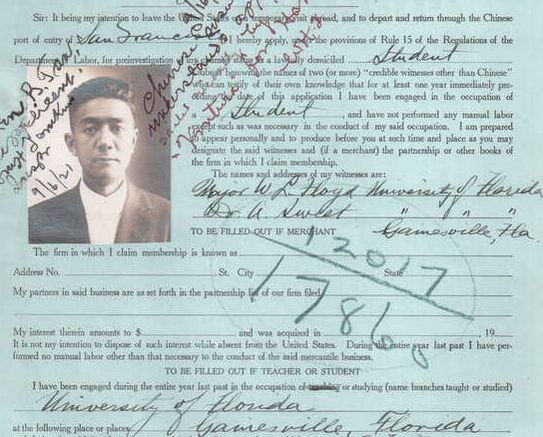Len Bo (L.B.) Tan
|
"[In 1910], Manchurian Prince Zaitao, uncle to the last emperor of China who was charged with the affairs of military consultancy, began a world tour of 8 countries to examine the military technology of the time in an effort to strengthen China’s own military. On April 22...aboard the S.S. Chiyo Maru, the Prince and his 16-member suite disembarked in San Francisco...one member of his suite, a young 16-year-old boy by the name of Len Bo (L.B.) Tan stayed behind in San Francisco with his uncle and did not return to China until more than a decade later...While all other Chinese arrivals were subjected to strict immigration policies and were oftentimes forced to endure long, excruciating, and even humiliating interviews and interrogations, L.B. Tan endured none of that."*
|
"Shortly after his arrival and for the next seven years, he would call 5424 Dover Street in Oakland, California his home and Mr. Frederick Hill and Mrs. Barbara Hill his guardians...L.B. had an experience that very few Chinese immigrants had during that time. He stayed with the Hills, a white American couple, who cared for him as one of their own and who sent him to school to receive an American education. Shortly after settling in with the Hills, L.B. entered the second grade at Longfellow Grammar School. After two years at Longfellow and quickly gaining rudimentary skills in English, he began attending Oakland High School and graduated from Oakland Technical High School in 1916. The following year he was admitted to the University of California in Berkeley, California."*
|
'"L.B. Tan entered the University of Florida as a junior on February 6th, 1920...In less than two years, L.B. became an esteemed member of the community and was respected and admired for his ambition. After having studied agriculture at the University of California and the University of Minnesota...L.B. continued the study of agriculture at U.F. During that time, the Florida Agricultural Experiment Station was a major artery of the university’s College of Agriculture. Directed by Professor Peter Henry Rolfs, the Experiment Station’s purpose was to make 'useful scientific discoveries on agricultural subjects” and to report on the results.'"*
|
"On August 12th, 1921, [L.B.] graduated from the University of Florida with a Bachelor of Science degree in Agriculture. After graduation, L.B. left Gainesville and headed back to San Francisco. For L.B. his connection to the university continued for a while longer, particularly with his correspondence with the university president, Dr. A.A. Murphree. L.B.’s letters to Dr. Murphree, who served as president from 1909-1927, are preserved in the archives of Smathers Library in Gainesville, FL."*


